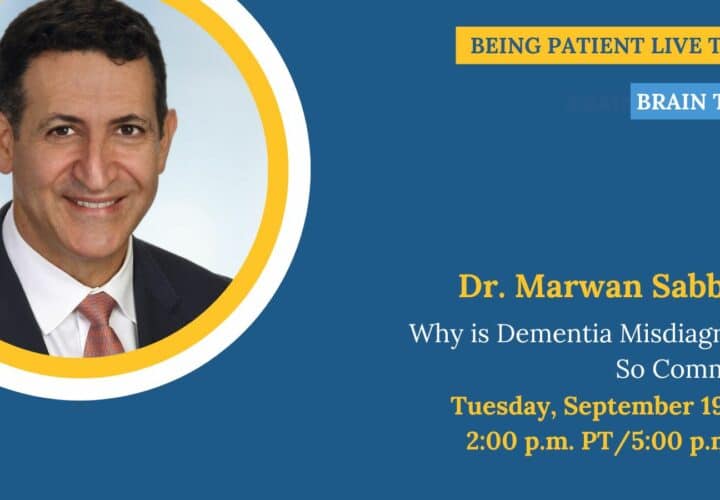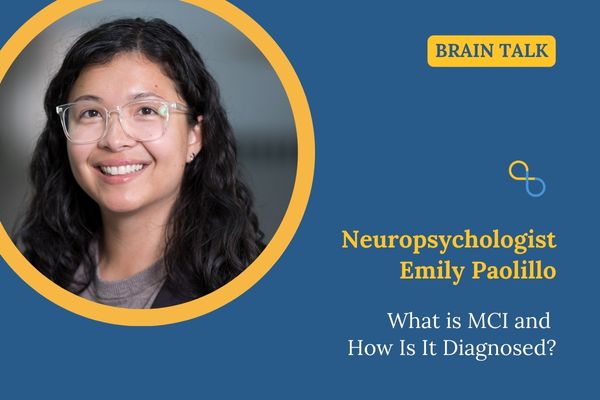When memory changes feel like more than “just aging,” how do you make sure your concerns are taken seriously? Experts share what signs to track, what to bring to your appointment, and how to advocate for further testing.
Memory loss, trouble following recipes, and getting lost in familiar places. Signs of dementia or mild cognitive impairment can be subtle at first. Many people feel something is off before tests confirm it.
Dementia advocate Doreen Monks, a former stroke care nurse, remembers when she began struggling with paperwork and forgot to pay bills. “I just thought I suddenly lost whatever intelligence I got…and couldn’t figure it out,” Monks said in a conversation with Being Patient. “It [felt like] my fault, not my brain’s fault.”
For people experiencing signs of cognitive impairment, one of the first places they can seek help is with their primary care doctor. However, sometimes it can be difficult to have that conversation and to fully communicate exactly what is causing concern. Especially in the early stages of neurodegenerative disease, doctors might dismiss cognitive changes related to Alzheimer’s or other brain conditions as normal aging or as symptoms of other things that cause cognitive issues, like menopause. According to Dr. Emily Paolillo, a neuropsychologist, signs like time disorientation, multitasking difficulties, and navigation issues could be a sign of mild cognitive impairment, a precursor to dementia — and patients should push to make sure their doctor takes their concerns seriously. Depression, anxiety, or sudden personality shifts can also be red flags.
“Age is related to a lot of declines in functioning that are pretty typical, but there are other things that can cause cognitive changes and MCI that are related to disease, one of which being Alzheimer’s disease,” Paolillo explained. “There are lots of other neurodegenerative diseases that can cause MCI and other health conditions as well, like stroke and other forms of cerebrovascular disease.”
Over the years, experts and patients have shared advice on navigating these initial conversations in Being Patient’s Live Talk series. We’ve compiled some advice from these interviews to help people navigate the delicate challenge of talking about memory changes. Read on for advice on what signs to highlight, what to bring to the doctor, and how to best advocate for yourself.
What to bring to your appointment
For Dr. Barak Gaster, the director of the University of Washington’s Cognition in Primary Care program, there are three major neurological warning signs that primary care doctors need to consider: losing short-term memory, having trouble completing everyday tasks, and becoming disoriented in a location they should know well.
While some people may experience early symptoms that don’t fall into these categories, these particular signs are major red flags. They ultimately represent three domains of cognition that, paired with a cognitive assessment such as the MOCA test (which we discuss below), could signal something is wrong.
“Neurodegenerative conditions are so complicated, and different people will manifest different domains of cognition as having impairment sooner than others,” Gaster explained. “That is why you need more than one domain to get a full picture of how somebody is doing.”
Before seeing a doctor, take notes on:
- Memory or attention changes
- Mood or personality shifts
- Specific examples (missed appointments, disorientation, etc.)
Also bring:
- A list of medications, including over-the-counter supplements
- A friend or family member who’s noticed changes
Key signs of cognitive issues to highlight
Changes in mental health, like a sudden onset of major depression, can also signal changes in your brain. If you or your loved one notices suddenly being more down, anxious, or even paranoid, that can also be a symptom worth investigating and mentioning to a doctor.
Even symptoms that seem unusual — such as hallucinations in taste or smell — can be meaningful. Gaster notes that visual hallucinations may signal Lewy body dementia, which requires a different approach to treatment.
As Barak Gaster explained in his Live Talk, a cognitive assessment such as the MOCA can be a great tool, but doctors also “need to put together a cognitive assessment together with some input of how somebody is navigating through the world.”
Dr. Barak Gaster: How to Pick Up on Early Signs of Alzheimer’s Disease
Several different pieces of information can serve as external input. One of the most common: independent commentary from a close friend or family member about how the person seeking diagnosis handles things like organization, time management, following recipes, and traveling to familiar locations. Sometimes, it turns out these are observations of someone’s personality changing, like becoming more irritated and overstimulated more easily.
Once the doctor can pair this input with a cognitive assessment and a person’s medical history, they can get a better picture of cognitive changes.
“Somebody who’s having visual hallucinations early on in the course of their cognitive impairment is at much higher risk of having Lewy body disease, and Lewy body disease has important diagnostic implications for somebody’s care,” Gaster explained. “They need to be referred to a specialist sooner because they need a more careful evaluation.”
Dr. Brent P. Forester, an expert in geriatric psychiatry at Tufts University, finds that depression or anxiety in someone who has never experienced these symptoms before can be a troubling sign.
“Memory loss is certainly an early sign of Alzheimer’s, but frankly, mood and anxiety symptoms are an early sign, potentially, of dementia,” Forester explained in a past interview. “It may be that it’s the underlying disease process coming out, and it’s manifesting with these psychiatric symptoms.”
Before going to the appointment, be sure to take note of symptoms that fall within different domains of cognition, memory changes, and even changes in mental health so that you’re prepared to talk about the most troubling changes to cognition.
One thing to keep in mind about symptoms like hallucinations is they can manifest differently than expected. Don Kent, who was misdiagnosed by six different neurologists, experienced hallucinations in his sense of taste. Sometimes, sweet things tasted salty, and what was salty tasted sweet. Because hallucinations can affect all five senses, keep track of all possible symptoms, so that doctors can get the entire picture.
What tests should you ask about?
Getting a cognitive test can help a primary care provider determine what is wrong and establish a baseline to use as a comparison tool in the future. Primary care doctors can do tests such as a 10-minute cognitive assessment, MOCA, and Mini-Cog for that initial evaluation. Ultimately, this and a patient’s medical history help doctors get a good picture of cognition.
Dr. Howard Fillit, co-founder and chief science officer of the Alzheimer’s Drug Discovery Foundation, explained in his interview that the role of primary care in this situation is to determine who should be referred to a specialist.
“There’s a very simple algorithm that primary care doctors can go through to determine, initially, what the cause of the cognitive impairment might be,” Fillit explained. “If it’s none of the above, then the next question is, ‘Is it Alzheimer’s?’”
Dr. Howard Fillit: The Future of Precision Medicine in Alzheimer’s Disease Treatment
Sometimes, however, even after testing, primary care physicians recommend checking again in six months instead of referring to a specialist.
This, as Paolillo explained in her interview, is because waiting and gathering more data on symptoms can be “the best marker to know if there’s true change over time as these repeat evaluations.”
However, if a patient feels there is something deeply wrong that is not getting picked up, it’s important they remember not to underestimate the power of what they know to be normal.
“Each patient’s individual experience tells them whether or not there’s been a change over time,” Paolillo explained. “You can push for these additional diagnostic tests, and being aware of what exists is step number one.”
Asking for diagnostic tests such as biomarker blood tests, if available, can help your doctor get a fuller picture of your cognitive and overall health, which can get you closer to determining what is wrong.
Your primary care doctor can perform initial assessments such as:
- MOCA (Montreal Cognitive Assessment)
- Mini-Cog
- 10-minute memory screen
These can help establish a baseline for future comparison. As Paolillo explains, “The best marker is repeat evaluations over time.”
If you’re concerned about certain symptoms, you can also ask about:
- Referral to a neurologist
- Brain imaging (MRI or PET scans)
- Biomarker testing, where available
If you’re not taken seriously…
If a doctor downplays your concerns, don’t hesitate to push back.
“You have to become your strongest advocate and demand further investigation. If you had chest pain, you would expect that the physician would do a certain EKG, and that’s normal– they’re going to do further testing,” Monks explained in her interview. “If there was a possibility of cancer, the same thing; they would do further investigation to rule in or rule out anything. You must mandate further investigation.”
Paolillo agrees.
“You’re in control of your healthcare, and your provider should be supportive of helping you achieve these healthcare goals,” she said. “Oftentimes, as patients, we have to advocate for ourselves. I would support anything that a patient wants to have more information on.”
Keep learning
Find more firsthand stories and expert advice by exploring our Live Talks archives.
Katy Koop is a writer and theater artist in Raleigh, NC.




